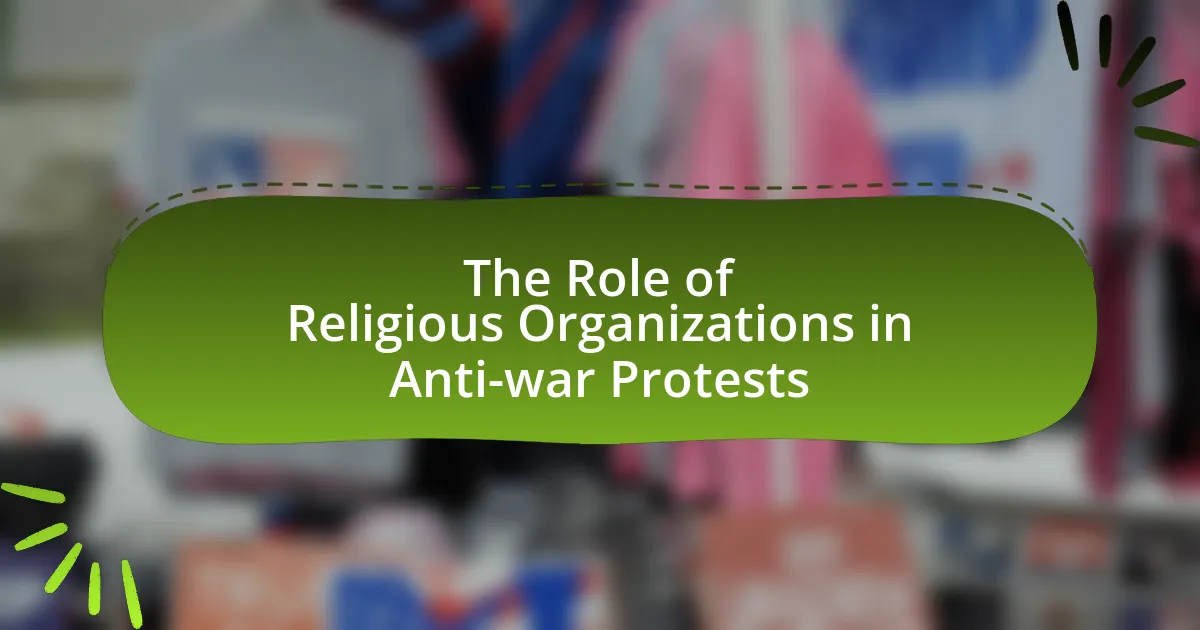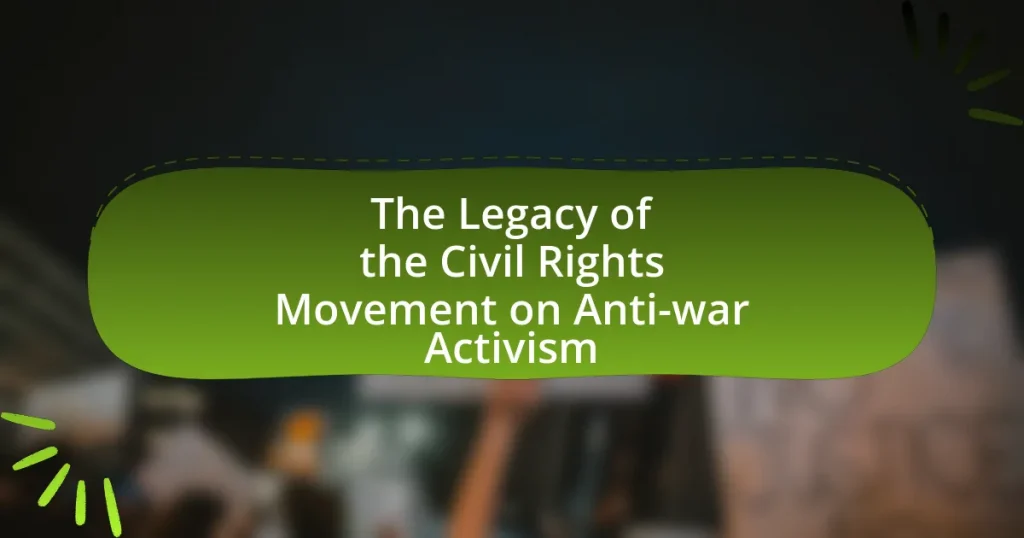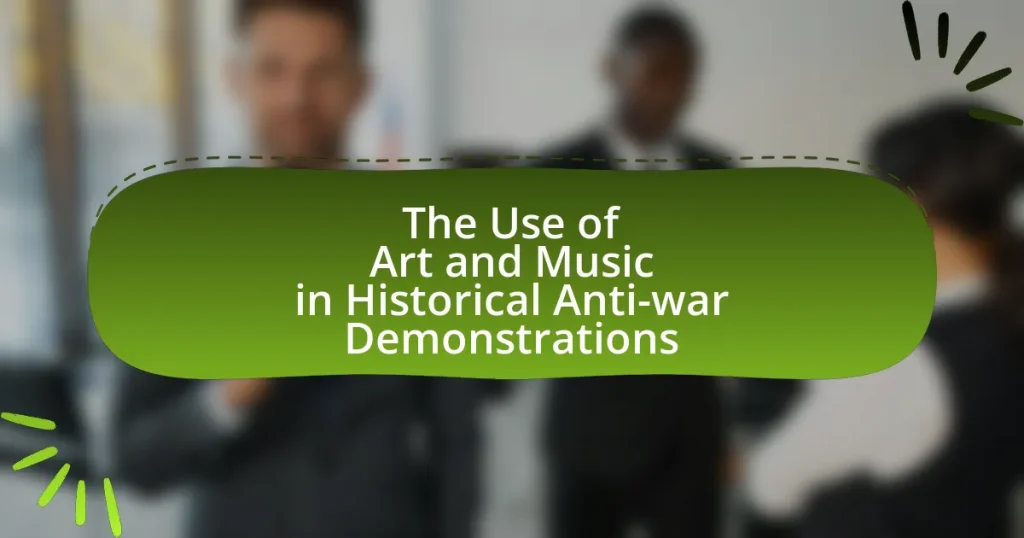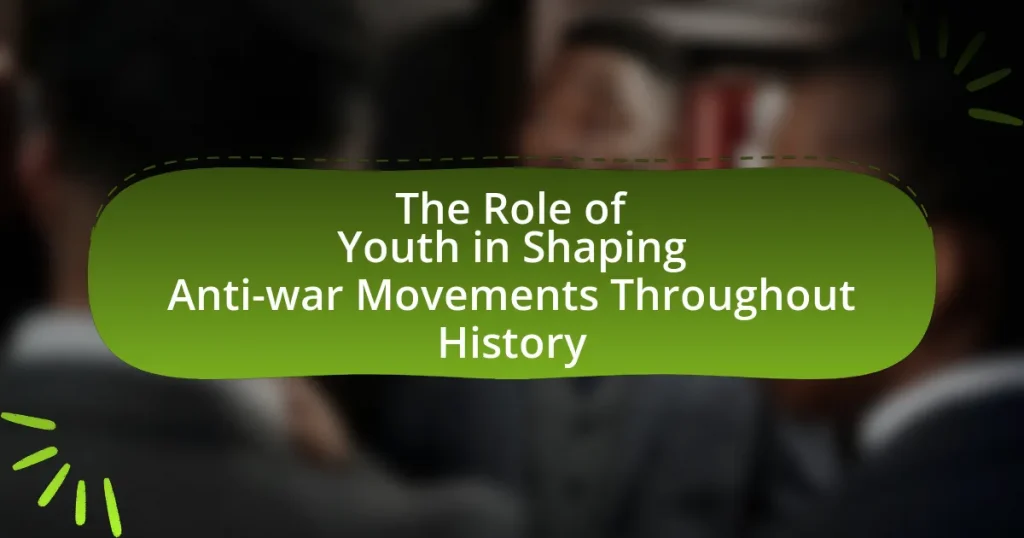Religious organizations play a crucial role in anti-war protests by mobilizing communities, providing moral frameworks, and advocating for peace based on their ethical teachings. They engage in various actions, such as organizing prayer vigils and facilitating peaceful demonstrations, while their beliefs significantly influence their stance against war. Historical contexts, such as the Vietnam War, illustrate how these organizations have actively opposed military conflicts, often forming interfaith coalitions to amplify their messages. The article explores the specific contributions of different faiths, the challenges faced by religious groups, and the effectiveness of their activism in shaping public opinion and influencing policy regarding war.
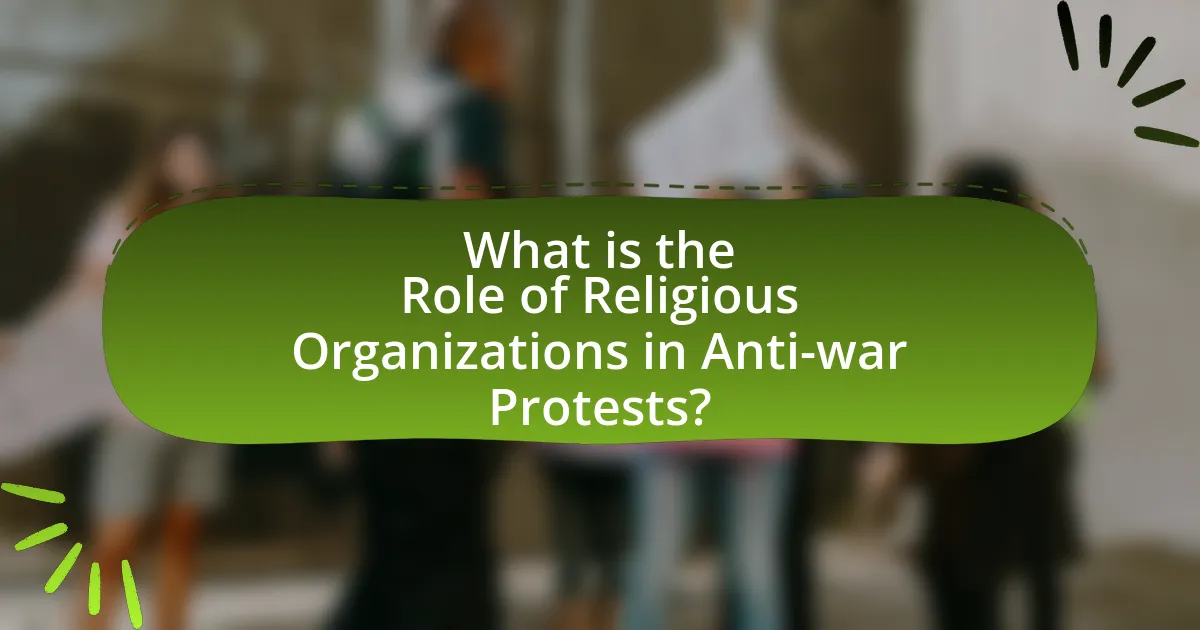
What is the Role of Religious Organizations in Anti-war Protests?
Religious organizations play a significant role in anti-war protests by mobilizing communities, providing moral frameworks, and advocating for peace based on their ethical teachings. These organizations often leverage their established networks to organize protests, raise awareness, and influence public opinion against war. For instance, during the Vietnam War, groups like the Quakers and various Christian denominations actively participated in protests, emphasizing the moral imperative of peace and non-violence. Their involvement often includes interfaith coalitions that unite diverse religious perspectives, amplifying the message against militarism and promoting dialogue. This collective action not only highlights the ethical concerns surrounding war but also fosters a sense of solidarity among participants, reinforcing the social movement’s impact.
How do religious organizations contribute to anti-war movements?
Religious organizations contribute to anti-war movements by mobilizing their communities, advocating for peace, and providing moral frameworks that oppose violence. These organizations often leverage their networks to organize protests, distribute literature, and engage in dialogue that emphasizes the ethical implications of war. For instance, during the Vietnam War, groups like the Quakers and the Catholic Workers Movement played significant roles in anti-war activism, emphasizing pacifism and social justice. Their teachings and community outreach efforts have historically influenced public opinion and policy, demonstrating the power of faith-based advocacy in promoting peace and opposing military conflict.
What specific actions do religious organizations take during protests?
Religious organizations often engage in specific actions during protests, including organizing prayer vigils, providing moral support, and facilitating peaceful demonstrations. For instance, they may hold interfaith prayer services to promote unity and peace among participants, as seen in various anti-war protests where faith leaders call for non-violence and reconciliation. Additionally, these organizations frequently mobilize their congregations to participate in marches, thereby amplifying the message against war and advocating for social justice. Historical examples include the role of religious groups in the Civil Rights Movement, where they were instrumental in organizing peaceful protests and advocating for change.
How do religious beliefs influence the stance of these organizations on war?
Religious beliefs significantly influence the stance of organizations on war by shaping their moral frameworks and ethical teachings. Many religious organizations advocate for peace and non-violence based on core tenets found in their scriptures, such as the Christian principle of loving one’s neighbor or the Islamic concept of peace (Salaam). For instance, the Quakers, a Christian denomination, have a long history of pacifism rooted in their belief that war contradicts the teachings of Jesus. Similarly, Islamic teachings emphasize the sanctity of life, leading many Muslim organizations to oppose war and advocate for peaceful resolutions. These beliefs often manifest in organized anti-war protests, where religious leaders and followers mobilize to promote peace and challenge militaristic policies, reflecting their commitment to their faith’s teachings on compassion and justice.
Why are religious organizations involved in anti-war protests?
Religious organizations are involved in anti-war protests primarily due to their commitment to peace, social justice, and the moral implications of war. Many religious teachings emphasize the sanctity of life and the importance of compassion, leading these organizations to advocate against violence and conflict. For instance, the Quakers have a long history of pacifism rooted in their faith, which drives their active participation in anti-war movements. Additionally, religious groups often mobilize their communities to address the humanitarian crises that arise from war, highlighting the ethical responsibility to protect vulnerable populations. This involvement is further supported by historical examples, such as the role of religious leaders during the Vietnam War, where figures like Martin Luther King Jr. used their platforms to speak out against military actions, reinforcing the connection between faith and activism for peace.
What historical contexts have prompted religious organizations to protest against wars?
Religious organizations have protested against wars in various historical contexts, notably during the Vietnam War, World War I, and World War II. During the Vietnam War, many religious groups, including the Quakers and various Christian denominations, opposed the conflict on moral grounds, emphasizing the sanctity of life and the call for peace. In World War I, organizations like the Fellowship of Reconciliation emerged, advocating for pacifism and opposing militarism, which they believed contradicted Christian teachings. Similarly, during World War II, religious leaders and groups, including the Catholic Church and various Protestant denominations, voiced their opposition to the war, arguing that it led to immense suffering and destruction, which was incompatible with their faith principles. These contexts illustrate how religious organizations have historically mobilized against wars based on ethical, moral, and theological beliefs.
How do religious teachings shape the anti-war messages of these organizations?
Religious teachings significantly shape the anti-war messages of organizations by promoting principles of peace, compassion, and the sanctity of life. For instance, many religious texts advocate for non-violence and reconciliation, which directly influence the rhetoric and actions of these organizations. The Quaker tradition emphasizes pacifism, leading groups like the American Friends Service Committee to actively oppose war based on their belief in the inherent worth of every individual. Similarly, the teachings of Buddhism, which stress the importance of compassion and the avoidance of harm, inspire organizations such as the Buddhist Peace Fellowship to engage in anti-war activism. These teachings provide a moral framework that not only condemns violence but also encourages followers to seek peaceful resolutions, thereby shaping the overall anti-war stance of these religious organizations.
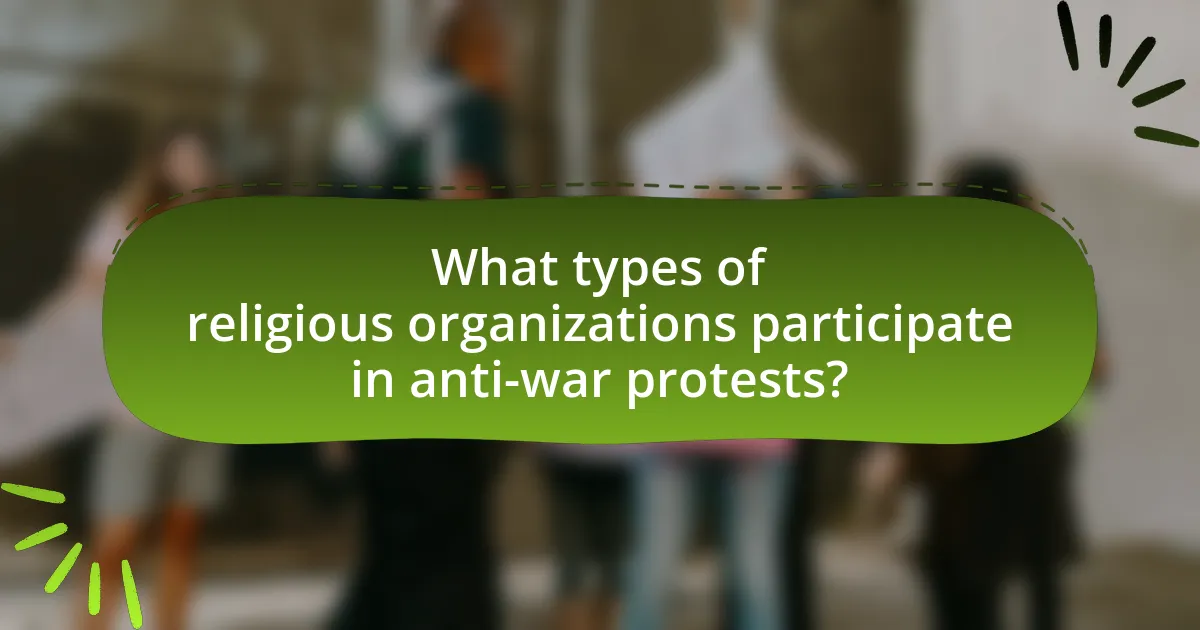
What types of religious organizations participate in anti-war protests?
Various types of religious organizations participate in anti-war protests, including Christian denominations, Jewish groups, Muslim organizations, and interfaith coalitions. Christian denominations such as the Quakers and various mainline Protestant churches have historically opposed war, advocating for peace and nonviolence based on their teachings. Jewish organizations like Jewish Voice for Peace actively campaign against military actions they view as unjust. Muslim groups, including the Muslim American Society, often engage in protests to voice opposition to wars that disproportionately affect Muslim communities. Interfaith coalitions, which unite members from different faith backgrounds, also play a significant role in organizing and participating in anti-war demonstrations, emphasizing shared values of peace and justice. These organizations collectively contribute to a diverse and impactful anti-war movement.
How do different faiths approach anti-war activism?
Different faiths approach anti-war activism through their core teachings and community actions, often emphasizing peace, justice, and the sanctity of life. For instance, Christianity, particularly through denominations like Quakers and Catholics, advocates for nonviolence based on the teachings of Jesus, promoting peace through prayer, dialogue, and social justice initiatives. Islam, through various organizations, emphasizes the concept of peace (Salaam) and often mobilizes communities to oppose war, citing the Quran’s teachings on justice and compassion. Buddhism promotes non-violence (Ahimsa) and encourages followers to engage in peaceful protests and mindfulness practices to foster understanding and reconciliation. Hinduism also advocates for non-violence and has seen movements like the one led by Mahatma Gandhi, which focused on peaceful resistance against oppression. These faith-based approaches are often supported by historical examples, such as the role of religious leaders in the Civil Rights Movement in the United States, demonstrating the significant impact of faith communities in anti-war activism.
What roles do interfaith coalitions play in anti-war protests?
Interfaith coalitions play a crucial role in anti-war protests by uniting diverse religious groups to advocate for peace and social justice. These coalitions leverage their collective moral authority to mobilize communities, promote dialogue, and challenge militaristic policies. For instance, organizations like the Interfaith Peace-Builders have historically organized protests and educational events that emphasize the ethical implications of war, drawing on shared values across different faith traditions. This collaborative approach not only amplifies the message against war but also fosters a sense of solidarity among various religious communities, enhancing the overall impact of the protests.
How do grassroots religious groups differ from larger religious institutions in their activism?
Grassroots religious groups differ from larger religious institutions in their activism primarily through their localized focus and direct community engagement. Grassroots groups often prioritize immediate social issues, mobilizing members for local actions such as protests, community service, and advocacy, which allows them to respond quickly to specific needs and injustices. In contrast, larger religious institutions typically engage in broader, more institutionalized forms of activism, often focusing on policy advocacy and global issues, which can result in slower responses to local crises.
For example, during the Vietnam War, grassroots religious organizations like the Fellowship of Reconciliation actively organized local anti-war protests, while larger denominations often issued statements or engaged in lobbying efforts at a national level. This distinction highlights how grassroots groups can foster a sense of urgency and personal connection to activism, making their efforts more immediate and community-oriented compared to the more bureaucratic approach of larger institutions.
What are the challenges faced by religious organizations in anti-war protests?
Religious organizations face several challenges in anti-war protests, including internal divisions, public perception, and political pressures. Internal divisions arise when members have differing views on war and peace, leading to conflicts that can weaken collective action. Public perception challenges occur when religious groups are seen as politically biased or when their involvement is viewed as inappropriate for their spiritual mission. Political pressures from government entities or opposing groups can also hinder their participation, as they may fear backlash or loss of support from their congregations. These challenges complicate their ability to mobilize effectively and maintain a unified stance against war.
How do political pressures affect the participation of religious organizations?
Political pressures significantly influence the participation of religious organizations in anti-war protests by shaping their public stance and engagement strategies. When governments exert pressure, either through legislation, public opinion, or direct threats, religious organizations may feel compelled to align their actions with political expectations to maintain their legitimacy and influence. For instance, during the Vietnam War, many religious groups faced backlash for opposing the war, which led some to moderate their positions or withdraw from public protests to avoid alienating their congregations or facing governmental scrutiny. This dynamic illustrates how political contexts can constrain or motivate religious organizations’ involvement in social movements, ultimately affecting their capacity to mobilize followers and advocate for peace.
What internal conflicts arise within religious communities regarding anti-war activism?
Internal conflicts within religious communities regarding anti-war activism often stem from differing interpretations of religious teachings, the tension between pacifism and just war theory, and the varying political affiliations of community members. For instance, some members may advocate for peace based on scriptural mandates, while others may support military action as a means of protecting the innocent, leading to significant ideological divides. Additionally, the involvement of religious leaders in political discourse can create friction, as congregants may disagree on the appropriateness of such engagement. Historical examples include the divisions seen in Christian denominations during the Vietnam War, where some churches actively protested while others supported the war effort, highlighting the complexities of aligning faith with political action.
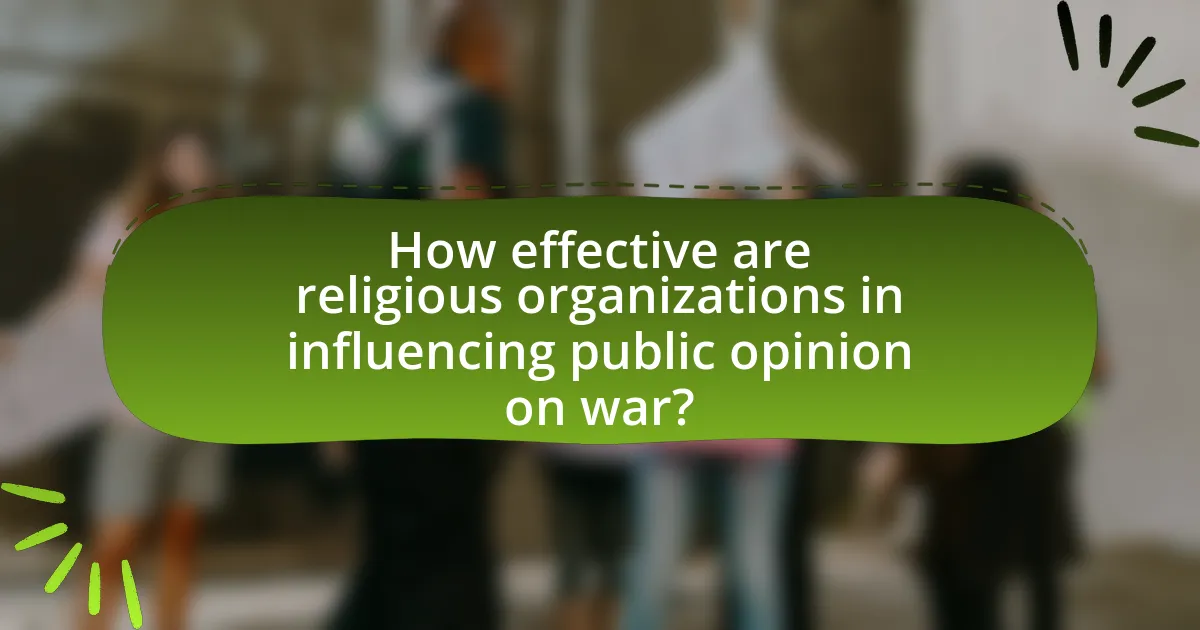
How effective are religious organizations in influencing public opinion on war?
Religious organizations are highly effective in influencing public opinion on war. They leverage moral authority and community networks to shape perceptions and mobilize individuals against military conflicts. For instance, during the Vietnam War, groups like the Quakers and the Catholic Church played pivotal roles in anti-war protests, significantly swaying public sentiment. Research by the Pew Research Center indicates that religious leaders can impact followers’ views on war, with 60% of Americans stating that clergy influence their opinions on military action. This demonstrates the substantial capacity of religious organizations to affect public discourse and mobilize collective action against war.
What strategies do religious organizations use to sway public sentiment?
Religious organizations use various strategies to sway public sentiment, including mobilizing community support, leveraging moral authority, and utilizing media outreach. By organizing events such as prayer vigils and community discussions, these organizations create a sense of solidarity and shared purpose among their members, which can influence broader public opinion. Their moral authority, derived from religious teachings, allows them to frame anti-war messages in a way that resonates with ethical and humanitarian concerns, appealing to the values of both their congregants and the general public. Additionally, effective media outreach, including press releases, social media campaigns, and partnerships with journalists, helps amplify their messages and reach wider audiences. For instance, during the Vietnam War, religious groups like the Quakers and various Christian denominations played significant roles in anti-war protests, using these strategies to mobilize public sentiment against the conflict.
How do religious leaders mobilize their congregations for anti-war efforts?
Religious leaders mobilize their congregations for anti-war efforts by leveraging their moral authority and community influence to promote peace and social justice. They often organize prayer vigils, sermons, and community discussions that emphasize the ethical implications of war, drawing on religious texts and teachings that advocate for non-violence. For instance, during the Vietnam War, many religious leaders, including figures like Martin Luther King Jr., used their platforms to speak out against the conflict, highlighting the moral responsibility to oppose violence. Additionally, they may collaborate with other organizations to amplify their message, creating coalitions that unite diverse groups in the pursuit of peace. This approach not only fosters a sense of community among congregants but also encourages collective action, such as participating in protests or lobbying efforts aimed at influencing policymakers.
What impact do religious organizations have on policy-making regarding war?
Religious organizations significantly influence policy-making regarding war by advocating for peace and ethical considerations in military actions. These organizations often mobilize their congregations and the public to oppose war, framing their arguments around moral and humanitarian grounds. For instance, during the Vietnam War, various religious groups, including the Quakers and the Catholic Church, actively protested against U.S. involvement, which contributed to a broader anti-war sentiment and influenced public opinion and policy decisions. Additionally, religious leaders frequently engage in dialogue with policymakers, providing a moral framework that can sway legislative outcomes related to military interventions. Their historical role in peace movements demonstrates their capacity to shape discourse and policy on war through advocacy, grassroots mobilization, and ethical appeals.
What lessons can be learned from the involvement of religious organizations in anti-war protests?
The involvement of religious organizations in anti-war protests teaches the importance of moral authority and community mobilization in social movements. Religious groups often leverage their ethical frameworks to advocate for peace, drawing on teachings that emphasize compassion and justice, which can resonate deeply with broader audiences. For instance, during the Vietnam War, organizations like the Quakers and the Catholic Church played pivotal roles in mobilizing protests, highlighting the moral imperative to oppose violence. Their participation not only provided a moral compass but also facilitated the gathering of diverse coalitions, demonstrating that faith-based activism can unite various segments of society against war. This illustrates that religious organizations can effectively influence public opinion and policy by framing anti-war sentiments within a moral context.
How can religious organizations improve their effectiveness in future protests?
Religious organizations can improve their effectiveness in future protests by fostering interfaith collaboration and leveraging their moral authority to mobilize communities. By uniting diverse faith groups, they can amplify their message and reach a broader audience, as seen in the 2017 Women’s March, where various religious leaders came together to advocate for social justice. Additionally, utilizing social media platforms for outreach and engagement can enhance visibility and participation, evidenced by the significant online mobilization during the Black Lives Matter protests. These strategies can create a more unified and impactful presence in future protests.
What best practices can be adopted from successful anti-war campaigns led by religious groups?
Successful anti-war campaigns led by religious groups can adopt best practices such as fostering interfaith collaboration, utilizing nonviolent resistance, and emphasizing moral and ethical arguments against war. Interfaith collaboration, as seen in the 2003 “Not In Our Name” campaign, unites diverse religious communities, amplifying the message and broadening support. Nonviolent resistance, exemplified by the Quaker-led anti-war efforts during the Vietnam War, effectively draws attention to the cause while maintaining moral high ground. Additionally, framing the anti-war message in terms of compassion and justice resonates deeply with religious teachings, as demonstrated by the Catholic Church’s opposition to the Iraq War, which highlighted the humanitarian impact of conflict. These practices enhance the effectiveness and reach of anti-war initiatives led by religious organizations.
